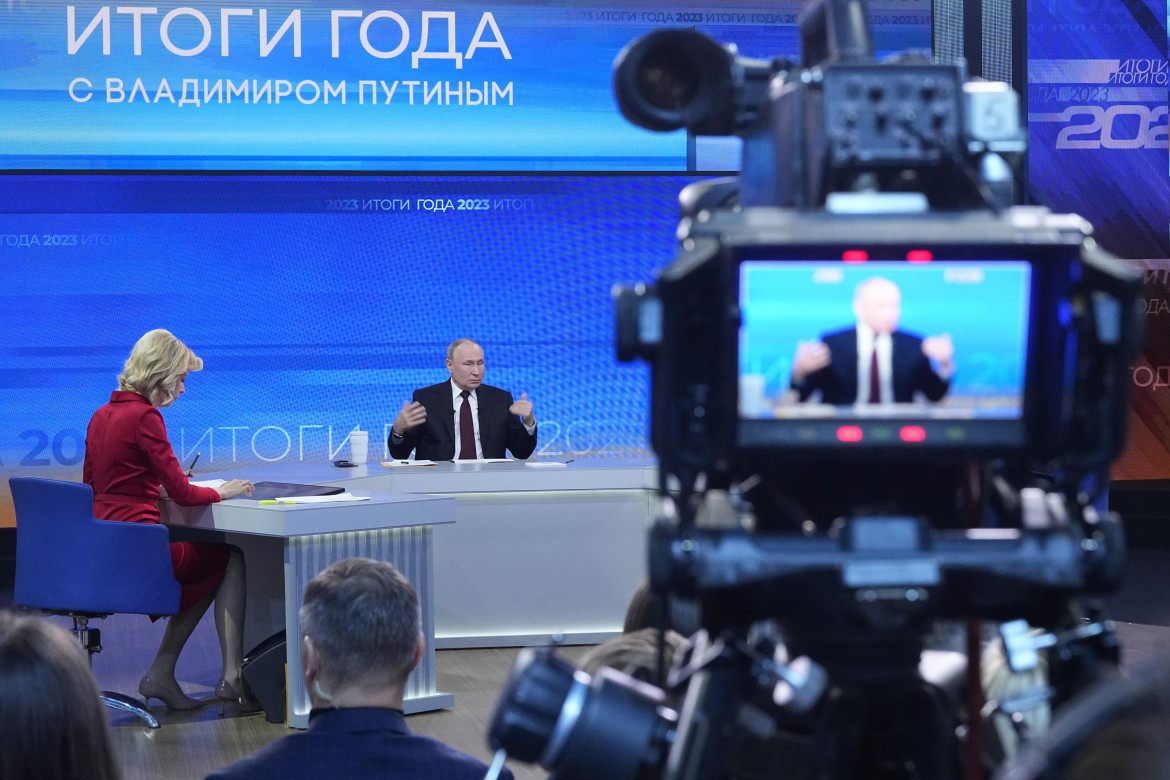Analysis
The world according to Putin: Constant, repetitive, patient
Putin’s choreographed press conference was meant to show his resolve on Ukraine. ‘Today, Ukraine produces almost nothing. Everything is supplied to it. But all that, it seems, is running out.’

“Russia’s objectives in Ukraine have not changed, and peace will not be possible until they are achieved.” Not backing down one inch, Russian President Vladimir Putin reiterated his vision of the world and global geopolitical balances at his end-of-year press conference on Thursday. It was a well-choreographed four-hour show in which the head of state answered questions from the audience and the press and even indulged in a skit with Artificial Intelligence.
“President,” he was asked over a mock video link, “there is a rumor in the Western press that you use look-alikes.” The audience in the room laughed and Vladimir Vladimirovich hinted at a smirk, then pretended to take notes as he listened with affected attention.
“Only one person can be like me and speak with my voice, and that is me,” the leader declared. But the brief comic interlude, which was really meant to counteract a rumor that has been reappearing periodically in the media for nearly two years, was only a small part of an event designed to strengthen the impression that the Kremlin is untroubled, secure and strong. Last year, the conference was canceled at the last minute without a reason given. This year, the TV networks broadcast it live in its entirety and everything went carefully according to plan, starting with his opening sentence: “The existence of our country without sovereignty is impossible. It simply will not exist.”
When will he be satisfied with the results in Ukraine? “I will remind you what we were talking about at the start: the denazification and demilitarization of Ukraine, its neutral status. Today, Ukraine produces almost nothing. Everything is supplied to it. But all that, it seems, is running out.” This, the Russian president argued, means a de facto “demilitarization” of the enemy.
“There is a short but important question that many are worried about,” asked TV journalist Pavel Zarubin: “Will there be a second wave of mobilization?” Putin had a ready answer, knowing well that entire regions of the Federation are terrified that their children will be forcibly called to arms: “We had a partial mobilization, and on that occasion we called up 300,000 people.” Now, he claimed, there were about 617,000 soldiers engaged in Ukraine, of whom 486,000 had voluntarily enlisted for a period of 1-3 years.
“The flow of our men who are ready to defend the interests of the homeland with weapons in hand shows no signs of slowing down,” he claimed, and said there were currently 244,000 men on the front lines.
On the other hand, Putin refused to provide numbers on the losses of his armed forces; he also criticized those who “make fun of” soldiers and “call them names.” According to a U.S. report, there have been around 315,000 Russian dead or wounded since the start of Special Military Operation, corresponding to about 90 percent of the original invasion force.
Putin also thanked a woman from Luhansk who praised him for making her region “part of the Russian Federation,” and showed dutiful humility in front of a veteran who said he was “honored” to be able to speak with him. At the same time as his broadcast, NATO Secretary General Jens Stoltenberg held a press conference at the alliance’s headquarters in Brussels in which he warned, “If Putin wins in Ukraine, there is real risk that his aggression will not end there.” In that regard, the Kremlin leader claimed that his country had no problems with Europe, or even with the U.S.: “As for the normalization of relations, it does not depend only on us.” He also reiterated his claim that there had been a 2014 “coup” in Ukraine.
Putin also claimed he had not changed his mind that “Russians and Ukrainians are essentially one people,” “despite the current tragic developments” — a “despite” which, unfortunately, points to the seeds of the deep hatred that now divides the two peoples.
He also claimed he was saddened by the state of European countries: “the point is that they have largely lost their sovereignty and are making many decisions to their detriment.”
“On the outside, many European politicians may look like General de Gaulle, but in reality they are more like Marshal Pétain,” he quipped.
Before the European Council began and Orbán sold off his theatrical stubbornness for a few billion euros of unlocked funds, Putin event went as far as to praise him: he and Robert Fico, he claimed, “are not pro-Russia politicians, but pro-national: they are defending the interests of their countries.”
“Perhaps it all has to do with Europe’s over-dependence on Big Brother, the United States. But we are ready to build relations with them, and we are also ready to build relations with the United States. We believe that America is an important country on the world stage. But this absolutely imperial policy that the country is pursuing is bad for themselves,” he added.
He also claimed that Russia will grow economically despite the sanctions, and that Moscow’s projections are that “Russian GDP will increase by 3.5 percent by the end of the year,” boosted by the arms industry. When asked about inflation, which could spike to 8 percent, he was less boastful and more hopeful: “The Central Bank and the government are taking measures to bring it back to the right levels.”
That is what the world according to Putin is like: constant, repetitive and patient, like a spider waiting for its prey to trap itself. Unfortunately, there are far more than just two players in the game, and the web might get very tangled indeed – as shown by Thursday’s decision by the EU to start EU accession negotiations with Ukraine.
Originally published at https://ilmanifesto.it/il-mondo-di-putin-ucraina-esaurita-niente-passi-indietro on 2023-12-15
